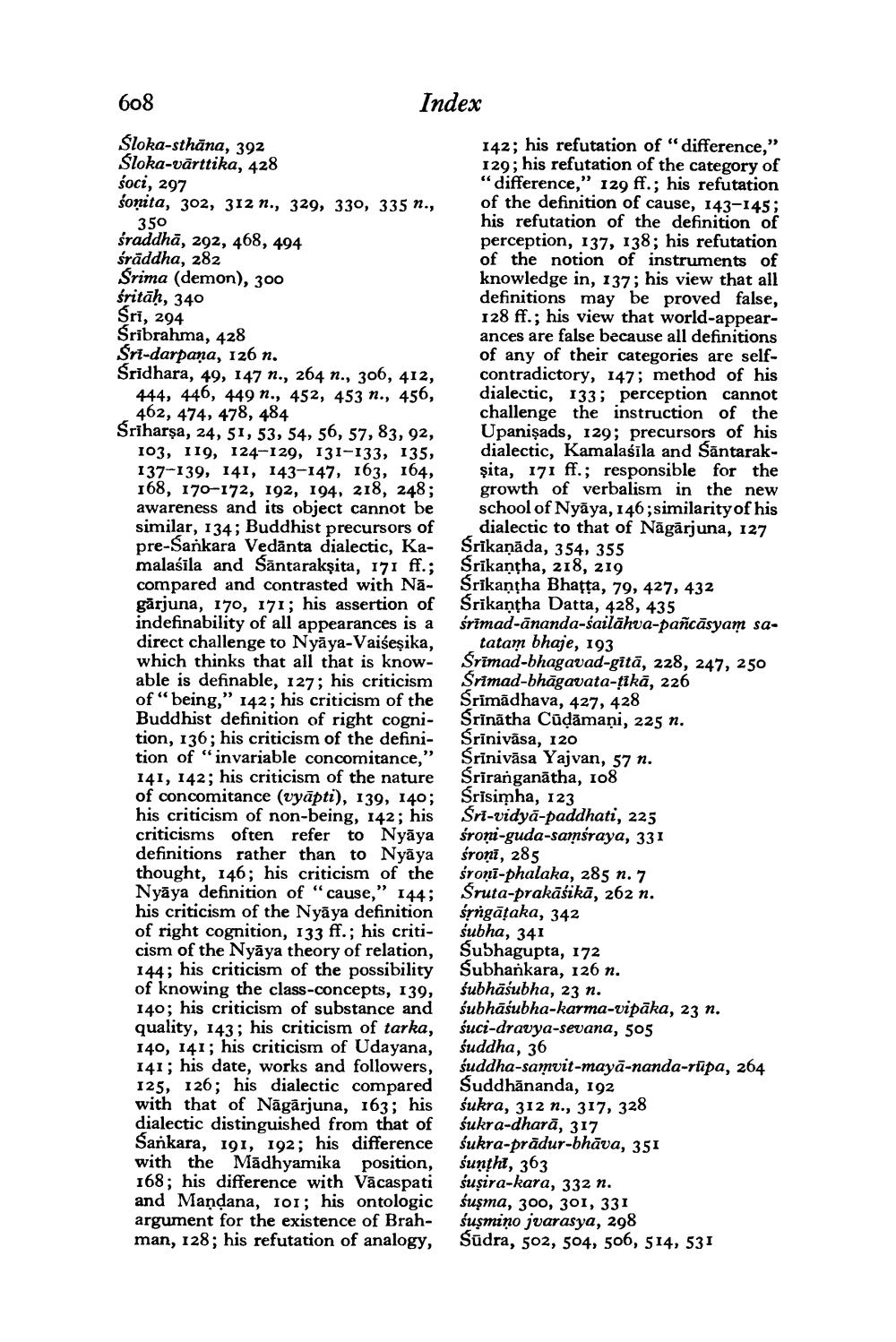________________
608
Śloka-sthāna, 392 Sloka-värttika, 428
Index
soci, 297
sonita, 302, 312 n., 329, 330, 335 n.,
350
śraddha, 292, 468, 494 śräddha, 282
Srima (demon), 300 śritāḥ, 340 Śri, 294 Śribrahma, 428 Sri-darpana, 126 n.
Sridhara, 49, 147 n., 264 n., 306, 412, 444, 446, 449 n., 452, 453 n., 456, 462, 474, 478, 484
Sriharṣa, 24, 51, 53, 54, 56, 57, 83, 92,
103, 119, 124-129, 131-133, 135, 137-139, 141, 143-147, 163, 164, 168, 170-172, 192, 194, 218, 248; awareness and its object cannot be similar, 134; Buddhist precursors of pre-Sankara Vedanta dialectic, Kamalasila and Santarakṣita, 171 ff.; compared and contrasted with Nagarjuna, 170, 171; his assertion of indefinability of all appearances is a direct challenge to Nyaya-Vaiśeşika, which thinks that all that is knowable is definable, 127; his criticism of "being," 142; his criticism of the Buddhist definition of right cognition, 136; his criticism of the definition of "invariable concomitance," 141, 142; his criticism of the nature of concomitance (vyapti), 139, 140; his criticism of non-being, 142; his criticisms often refer to Nyaya definitions rather than to Nyaya thought, 146; his criticism of the Nyaya definition of "cause," 144; his criticism of the Nyaya definition of right cognition, 133 ff.; his criticism of the Nyaya theory of relation, 144; his criticism of the possibility of knowing the class-concepts, 139, 140; his criticism of substance and quality, 143; his criticism of tarka, 140, 141; his criticism of Udayana, 141; his date, works and followers, 125, 126; his dialectic compared with that of Nagarjuna, 163; his dialectic distinguished from that of Sankara, 191, 192; his difference with the Madhyamika position, 168; his difference with Vacaspati and Mandana, 101; his ontologic argument for the existence of Brahman, 128; his refutation of analogy,
142; his refutation of "difference,' 129; his refutation of the category of "difference," 129 ff.; his refutation of the definition of cause, 143-145; his refutation of the definition of perception, 137, 138; his refutation of the notion of instruments of knowledge in, 137; his view that all definitions may be proved false, 128 ff.; his view that world-appearances are false because all definitions of any of their categories are selfcontradictory, 147; method of his dialectic, 133; perception cannot challenge the instruction of the Upanisads, 129; precursors of his dialectic, Kamalaśīla and Santarakşita, 171 ff.; responsible for the growth of verbalism in the new school of Nyaya, 146; similarity of his dialectic to that of Nagarjuna, 127 Śrikanāda, 354, 355 Srikantha, 218, 219 Srikantha Bhatta, 79, 427, 432 Srikantha Datta, 428, 435 śrimad-ananda-sailähva-pañcāsyam satatam bhaje, 193 Srimad-bhagavad-gitā, 228, 247, 250 Srimad-bhagavata-ṭikā, 226 Śrīmādhava, 427, 428 Srinatha Cūdāmaņi, 225 n. Srinivasa, 120 Srinivasa Yajvan, 57 n. Sriranganatha, 108 Śrisimha, 123 Sri-vidya-paddhati, 225 śroni-guda-samśraya, 331 śroni, 285 śroni-phalaka, 285 n. 7 Śruta-prakāśikā, 262 n. śṛngāṭaka, 342 subha, 341 Subhagupta, 172 Subhankara, 126 n. subhaśubha, 23 n. subhasubha-karma-vipäka, 23 n. śuci-dravya-sevana, 505 śuddha, 36
suddha-samvit-maya-nanda-rupa, 264 Suddhananda, 192
śukra, 312 n., 317, 328 sukra-dhara, 317 śukra-pradur-bhāva, 351 suntht, 363
suşira-kara, 332 n. śuşma, 300, 301, 331 śuşmino jvarasya, 298 Sūdra, 502, 504, 506, 514, 531




